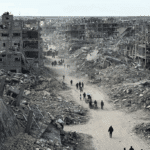
On September 15, 2020, 6 complaints were filed at the High Courts in Kinshasa, Mbuji-Mayi (Kasai Oriental), Lubumbashi (Haut Katanga), and Kindu (Maniema). Written in the name of citizens and civil society organisations, they ask the competent judges to recognize instances of arbitrary detention as well as the disastrous state of prisons in the country, particularly due to prison overcrowding. This action also seeks recognition of the State’s liability for the damages suffered by the plaintiffs.
For the past 8 years, ASF has been carrying out actions to defend the rights of people detained arbitrarily or in conditions contrary to the principle of the rule of law. And In 66% of cases, significant results were noted, either by obtaining the release of the person, or by referral to the court of judgment.
In the logic of this intervention, and in the pursuit of a dialogue with the country’s authorities, ASF and its partners aim to question the State’s liability regarding the extreme overcrowding in prisons, the resulting disastrous conditions of detention, but also the abusive use of long-term preventive detention. For example, X, a 24-year-old man, was arrested in 2010 in the context of a land dispute for which he allegedly refused to testify. Prosecuted for malicious destruction of property, he was imprisoned for ten years without trial before being recently released following the actions of the Detention ExPEERience network.
For more than a decade, ASF and many Congolese and international actors have been reporting on the alarming situation in the prisons of the DRC. The buildings are in a dilapidated state and have often not been renovated for half a century. Shortages in food and deficiencies in providing basic hygiene needs for prisoners are responsible for a lot of fatalities each year.
Overcrowding is the norm in most prisons. In the Makala prison in Kinshasa, 9,000 prisoners are incarcerated, whereas, in principle, the prison cannot welcome more than 1.500 people. This extreme overpopulation finds its source in the abusive and almost systematic use of pre-trial detention. A practice often diverted from its initial objective – the exceptional detention of a person within the strict framework defined by the law for the purpose of a trial -, pretrial detention is used for the benefit of private interests, political and economic. There have been frequent reports of cases in which prisoners are left in prisons because they cannot “pay their way out “.
All these observations have pushed ASF to develop, since January 2020, Detention ExPEERience, a network of lawyers and experts who defend the rights of prisoners and try to positively influence the penal systems in the DRC, but also in other countries. In particular, the Network deals with strategic litigation. By defending emblematic cases, ASF hopes to have a lasting impact on the strengthening of the rule of law in the judicial and penitentiary fields.
Such actions, even if unheard of in the DRC, have already been undertaken in other countries. The European Court of Human Rights has recently condemned the France for the poor conditions of detention in its prisons and linked it to overcrowding.
Through the litigation actions introduced, ASF and its partners, convinced that the promotion of the rule of law and democratic principles cannot go without a full compliance with human rights for all persons without distinction, including detained persons, hope that the judiciary, which is in principle independent and impartial, can make decisions to place the competent authorities before their responsibilities and to provide a lasting solution to prison congestion and severe human rights violations in detention.



